| Listing 1 - 10 of 35 | << page >> |
Sort by
|
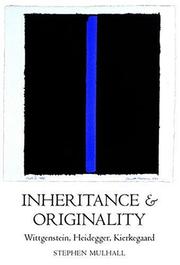
ISBN: 0199243905 Year: 2001 Publisher: Oxford Clarendon Press
Abstract | Keywords | Export | Availability | Bookmark
 Loading...
Loading...Choose an application
- Reference Manager
- EndNote
- RefWorks (Direct export to RefWorks)
History of philosophy --- Kierkegaard, Søren --- Heidegger, Martin --- Wittgenstein, Ludwig J.J. --- Methodology --- -Methodology --- -Philosophy --- Research --- History --- -History --- -Kierkegaard, Soren --- -Wittgenstein, Ludwig --- -Contributions in methodology --- Contributions in methodology --- -Anti-climacus --- H. H. --- -Heidegger, Martin --- Wittgenstein, Ludwig --- Philosophy --- Heidegger, Martin, --- Kierkegaard, Søren, --- Wittgenstein, Ludwig, --- Wei-tʻe-ken-ssu-tʻan, --- Wei-tʻe-ken-ssu-tʻan, Lu-te-wei-hsi, --- Wittgenstein, L. --- Vitgenshteĭn, L., --- Wei-ken-ssu-tʻan, --- Pitʻŭgensyutʻain, --- Vitgenshteĭn, Li︠u︡dvig, --- Weitegenshitan, --- Wittgenstein, Ludovicus, --- Vitgenshtaĭn, Ludvig, --- ויטגנשטיין, לודוויג --- 维特根斯坦, --- Anti-climacus --- Kierkegaard, Søren. --- 19th century --- 20th century --- Wittgenstein, Ludwig, - 1889-1951 - Contributions in methodology. --- Heidegger, Martin, - 1889-1976 - Contributions in methodology. --- Kierkegaard, S²ren, - 1813-1855 - Contributions in methodology. --- Methodology - History - 19th century. --- Methodology - History - 20th century. --- Wittgenstein, Ludwig Josef Johann, --- Khaĭdegger, Martin, --- Haĭdegger, Martin, --- Hīdajar, Mārtin, --- Hai-te-ko, --- Haidegŏ, --- Chaitenger, Martinos, --- Chaitenker, Martinos, --- Chaintenger, Martin, --- Khaĭdeger, Martin, --- Hai-te-ko-erh, --- Haideger, Marṭinn, --- Heidegger, M. --- Haideger, Martin, --- Hajdeger, Martin, --- הייגדר, מרתין --- היידגר, מרטין --- היידגר, מרטין, --- 海德格尔, --- Chaintenker, Martin, --- Hāydigir, Mārtīn, --- Hīdigir, Mārtīn, --- هاىدگر, مارتين, --- هىدگر, مارتين, --- Humanities Methodology --- Anti-Climacus, --- Bogbinder, Hilarius, --- Chʻi-kʻo-kuo, --- Climacus, Johannes, --- Constantius, Constantin, --- Eremita, Victor, --- Haufniensis, Vigilius, --- Johannes, Climacus, --- Johannes de Silentio, --- Kʹerkegor, Seren, --- Kierkegaard, S. --- Kierkegaard, Severino, --- Kierkegaard, Søren Aabye, --- K'i︠e︡rkegor, Sʹoren, --- Kīrkajūrd, Sūrīn, --- Kirkegaard, Soeren, --- Kirkegor, Seren, --- Ḳirḳegor, Sern, --- Kirkegors, Sērens, --- Kirukegōru, Søren, --- Kjerkegor, Seren, --- Kʻo-erh-kʻai-ko-erh, --- Notabene, Nicolaus, --- Silentio, Johannes de, --- Sūrīn Kīrkajūrd, --- Victor, Eremita, --- Vigilius, Haufniensis, --- קירקגור, סרן --- קירקגור, סורן --- קירקגור, סירן --- קירקגור, סירן, --- קירקגורד, סרן, --- 克尓凯郭尓,
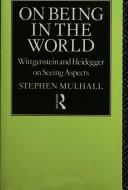
ISBN: 0415044162 9780415044165 Year: 1990 Publisher: London Routledge
Abstract | Keywords | Export | Availability | Bookmark
 Loading...
Loading...Choose an application
- Reference Manager
- EndNote
- RefWorks (Direct export to RefWorks)
Theory of knowledge --- Heidegger, Martin --- Wittgenstein, Ludwig J.J. --- Visual perception. --- Language and languages --- Psychology --- Philosophy. --- Languages --- -Psychology --- -Visual perception --- Optics, Psychological --- Vision --- Perception --- Visual discrimination --- Behavioral sciences --- Mental philosophy --- Mind --- Science, Mental --- Human biology --- Philosophy --- Soul --- Mental health --- Foreign languages --- Anthropology --- Communication --- Ethnology --- Information theory --- Meaning (Psychology) --- Philology --- Linguistics --- Psychological aspects --- Davidson, Donald --- Wittgenstein, Ludwig --- Visual perception --- Davidson, Donald, --- Heidegger, Martin, --- Wittgenstein, Ludwig, --- Wei-tʻe-ken-ssu-tʻan, --- Wei-tʻe-ken-ssu-tʻan, Lu-te-wei-hsi, --- Wittgenstein, L. --- Vitgenshteĭn, L., --- Wei-ken-ssu-tʻan, --- Pitʻŭgensyutʻain, --- Vitgenshteĭn, Li︠u︡dvig, --- Weitegenshitan, --- Wittgenstein, Ludovicus, --- Vitgenshtaĭn, Ludvig, --- ויטגנשטיין, לודוויג --- 维特根斯坦, --- Wittgenstein, Ludwig Josef Johann, --- Khaĭdegger, Martin, --- Haĭdegger, Martin, --- Hīdajar, Mārtin, --- Hai-te-ko, --- Haidegŏ, --- Chaitenger, Martinos, --- Chaitenker, Martinos, --- Chaintenger, Martin, --- Khaĭdeger, Martin, --- Hai-te-ko-erh, --- Haideger, Marṭinn, --- Heidegger, M. --- Haideger, Martin, --- Hajdeger, Martin, --- הייגדר, מרתין --- היידגר, מרטין --- היידגר, מרטין, --- 海德格尔, --- Chaintenker, Martin, --- Hāydigir, Mārtīn, --- Hīdigir, Mārtīn, --- هاىدگر, مارتين, --- هىدگر, مارتين, --- Language and languages - Philosophy. --- Psychology - Philosophy.
Book
ISBN: 9780691137360 9780691137377 Year: 2009 Publisher: Princeton, N.J. Princeton University Press
Abstract | Keywords | Export | Availability | Bookmark
 Loading...
Loading...Choose an application
- Reference Manager
- EndNote
- RefWorks (Direct export to RefWorks)
In The Wounded Animal, Stephen Mulhall closely examines Coetzee's writings about Costello, and the ways in which philosophers have responded to them, focusing in particular on their powerful presentation of both literature and philosophy as seeking, and failing, to represent reality--in part because of reality's resistance to such projects of understanding, but also because of philosophy's unwillingness to learn from literature how best to acknowledge that resistance. In so doing, Mulhall is led to consider the relations among reason, language, and the imagination, as well as more specific ethical issues concerning the moral status of animals, the meaning of mortality, the nature of evil, and the demands of religion. The ancient quarrel between philosophy and literature here displays undiminished vigor and renewed significance.
Coetzee, J.M. --- Philosophy in literature --- Animals (Philosophy) --- Literature --- Philosophy --- Coetzee, J. M., --- Criticism and interpretation --- Philosophy in literature. --- Philosophy. --- Criticism and interpretation. --- Animals (Philosophy). --- Coetzee, John Maxwell --- Literature and philosophy --- Philosophy and literature --- Theory --- Coetzee, John M., --- Кутзее, Дж. М., --- Kutzee, Dzh. M., --- קוטזי, ג׳. מ., --- Кутзее, Джон Максвелл, --- Kutzee, Dzhon Maksvell, --- Coetzee, John Maxwell M. --- Coetzee, J. M. --- Coetzee, John M. --- Кутзее, Дж. М. --- Kutzee, Dzh. M. --- Кутзее, Джон Максвелл --- Kutzee, Dzhon Maksvell
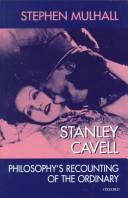
ISBN: 0198240740 9780198240747 Year: 1994 Publisher: Oxford Clarendon
Abstract | Keywords | Export | Availability | Bookmark
 Loading...
Loading...Choose an application
- Reference Manager
- EndNote
- RefWorks (Direct export to RefWorks)
Psychanalyse et philosophie --- Psychoanalyse en filosofie --- Psychoanalysis and philosophy --- Philosophy, Modern --- Literature --- Psychoanalysis and philosophy. --- Motion pictures --- Philosophy. --- -Literature --- -Psychoanalysis and philosophy --- -Cinema --- Feature films --- Films --- Movies --- Moving-pictures --- Audio-visual materials --- Mass media --- Performing arts --- Philosophy and psychoanalysis --- Philosophy --- Belles-lettres --- Western literature (Western countries) --- World literature --- Philology --- Authors --- Authorship --- Modern philosophy --- History and criticism --- Cavell, Stanley --- -Philosophy --- Philosophy [Modern ] --- 20th century --- Cavell, Stanley, - 1926 --- -Philosophy [Modern ] --- Literature and philosophy --- Philosophy and literature --- Theory --- Cavell, Stanley, --- -Philosophy, Modern - 20th century. --- Literature - Philosophy. --- Motion pictures - Philosophy.
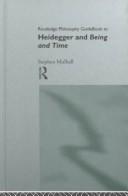
ISBN: 0415100933 Year: 1996 Volume: *1 Publisher: London Routledge
Abstract | Keywords | Export | Availability | Bookmark
 Loading...
Loading...Choose an application
- Reference Manager
- EndNote
- RefWorks (Direct export to RefWorks)
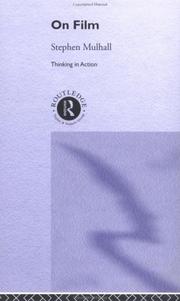
ISBN: 0415247969 0415247950 Year: 2002 Publisher: London Routledge
Abstract | Keywords | Export | Availability | Bookmark
 Loading...
Loading...Choose an application
- Reference Manager
- EndNote
- RefWorks (Direct export to RefWorks)
Few movies of recent times have caught and shocked our imagination as the Alien cinematic quartet and the quest of Sigourney Weaver's Flight Lieutenant Ellen Ripley. In this gripping and lucidly written book, Mulhall shows why these films fascinate us, by showing that they are compelling examples of philosophy in action. Bringing a philosopher's eye to cinema, he argues that the Alien films take us deep into the question of what it is to be human. By developing the sexual significance of the aliens themselves and of Ripley's resistance to them, these films explore the relation of human identity to the body, in the context of a hyper-Darwinian universe which both sharpens and subverts the distinction between the natural and the technological, and which pits the hope of redemption against nihilism. The book also considers the nature of "sequeldom" in contemporary cinema. What is the relation between each Alien movie's distinctive plot and the overarching narrative of the Alien universe? How does the work of each director who has contributed to the series relate to the themes of their other films, such as Ridley Scott's Blade Runner, James Cameron's Terminator and David Fincher's Se7en? [Publisher description].
Philosophy and psychology of culture --- Films de science-fiction --- Alien (Motion picture) --- Science fiction films --- History and criticism. --- Histoire et critique --- 791.41 --- CDL --- History and criticism
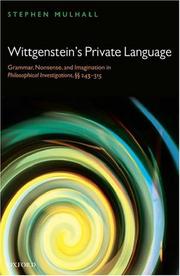
ISBN: 0199208549 9780199208548 0191526053 1280845724 9786610845729 1435621344 1282053418 9786612053412 0191565210 0199556741 0191709069 Year: 2007 Publisher: Oxford Clarendon
Abstract | Keywords | Export | Availability | Bookmark
 Loading...
Loading...Choose an application
- Reference Manager
- EndNote
- RefWorks (Direct export to RefWorks)
The author offers a new way of interpreting one of the most famous and contested texts in modern philosophy. He sheds new light on a central controversy concerning Wittgenstein's early work by showing its relevance to a proper understanding of the later work.
Philosophy of language --- Wittgenstein, Ludwig --- Wittgenstein, Ludwig, --- Language. --- Wei-tʻe-ken-ssu-tʻan, --- Wei-tʻe-ken-ssu-tʻan, Lu-te-wei-hsi, --- Wittgenstein, L. --- Vitgenshteĭn, L., --- Wei-ken-ssu-tʻan, --- Pitʻŭgensyutʻain, --- Vitgenshteĭn, Li︠u︡dvig, --- Weitegenshitan, --- Wittgenstein, Ludovicus, --- Vitgenshtaĭn, Ludvig, --- ויטגנשטיין, לודוויג --- 维特根斯坦, --- Wittgenstein, Ludwig Josef Johann, --- Wittgenstein, Ludwig, - 1889-1951. - Philosophische Untersuchungen --- Wittgenstein, Ludwig, - 1889-1951 - Language. --- Wittgenstein, Ludwig, - 1889-1951
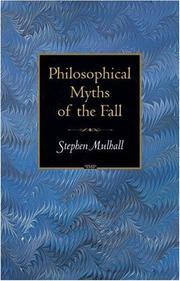
ISBN: 0691122202 0691133921 1282086677 1400826659 9786612086670 Year: 2005 Publisher: Princeton, N.J. Princeton University Press
Abstract | Keywords | Export | Availability | Bookmark
 Loading...
Loading...Choose an application
- Reference Manager
- EndNote
- RefWorks (Direct export to RefWorks)
Did post-Enlightenment philosophers reject the idea of original sin and hence the view that life is a quest for redemption from it? In Philosophical Myths of the Fall, Stephen Mulhall identifies and evaluates a surprising ethical-religious dimension in the work of three highly influential philosophers--Nietzsche, Heidegger, and Wittgenstein. He asks: Is the Christian idea of humanity as structurally flawed something that these three thinkers aim simply to criticize? Or do they, rather, end up by reproducing secular variants of the same mythology? Mulhall argues that each, in different ways, develops a conception of human beings as in need of redemption: in their work, we appear to be not so much capable of or prone to error and fantasy, but instead structurally perverse, living in untruth. In this respect, their work is more closely aligned to the Christian perspective than to the mainstream of the Enlightenment. However, all three thinkers explicitly reject any religious understanding of human perversity; indeed, they regard the very understanding of human beings as originally sinful as central to that from which we must be redeemed. And yet each also reproduces central elements of that understanding in his own thinking; each recounts his own myth of our Fall, and holds out his own image of redemption. The book concludes by asking whether this indebtedness to religion brings these philosophers' thinking closer to, or instead forces it further away from, the truth of the human condition.
Fall of man --- Philosophical anthropology --- #GGSB: Filosofie --- Anthropology, Philosophical --- Man (Philosophy) --- Civilization --- Life --- Ontology --- Humanism --- Persons --- Philosophy of mind --- Man, Fall of --- Sin --- Sin, Original --- Philosophy --- Heidegger, Martin --- Nietzsche, Friedrich Wilhelm --- Wittgenstein, Ludwig, --- Wei-tʻe-ken-ssu-tʻan, --- Wei-tʻe-ken-ssu-tʻan, Lu-te-wei-hsi, --- Wittgenstein, L. --- Vitgenshteĭn, L., --- Wei-ken-ssu-tʻan, --- Pitʻŭgensyutʻain, --- Vitgenshteĭn, Li︠u︡dvig, --- Weitegenshitan, --- Wittgenstein, Ludovicus, --- Vitgenshtaĭn, Ludvig, --- ויטגנשטיין, לודוויג --- 维特根斯坦, --- Wittgenstein, Ludwig Josef Johann, --- Nietzsche, Friedrich --- Nietzsche, Friederich --- Khaĭdegger, Martin, --- Haĭdegger, Martin, --- Hīdajar, Mārtin, --- Hai-te-ko, --- Haidegŏ, --- Chaitenger, Martinos, --- Chaitenker, Martinos, --- Chaintenger, Martin, --- Khaĭdeger, Martin, --- Hai-te-ko-erh, --- Haideger, Marṭinn, --- Heidegger, M. --- Haideger, Martin, --- Hajdeger, Martin, --- הייגדר, מרתין --- היידגר, מרטין --- היידגר, מרטין, --- 海德格尔, --- Chaintenker, Martin, --- Hāydigir, Mārtīn, --- Hīdigir, Mārtīn, --- هاىدگر, مارتين, --- هىدگر, مارتين, --- History of philosophy --- Religious studies --- Filosofie --- Philosophical anthropology. --- Philosophy. --- Nietzsche, Friedrich Wilhelm, --- Heidegger, Martin,
Book
ISBN: 1282086677 9786612086670 1400826659 9781400826650 9780691133928 0691133921 Year: 2007 Publisher: Princeton, NJ ; Woodstock : Princeton University Press,
Abstract | Keywords | Export | Availability | Bookmark
 Loading...
Loading...Choose an application
- Reference Manager
- EndNote
- RefWorks (Direct export to RefWorks)
Did post-Enlightenment philosophers reject the idea of original sin and hence the view that life is a quest for redemption from it? In Philosophical Myths of the Fall, Stephen Mulhall identifies and evaluates a surprising ethical-religious dimension in the work of three highly influential philosophers--Nietzsche, Heidegger, and Wittgenstein. He asks: Is the Christian idea of humanity as structurally flawed something that these three thinkers aim simply to criticize? Or do they, rather, end up by reproducing secular variants of the same mythology? Mulhall argues that each, in different ways, develops a conception of human beings as in need of redemption: in their work, we appear to be not so much capable of or prone to error and fantasy, but instead structurally perverse, living in untruth. In this respect, their work is more closely aligned to the Christian perspective than to the mainstream of the Enlightenment. However, all three thinkers explicitly reject any religious understanding of human perversity; indeed, they regard the very understanding of human beings as originally sinful as central to that from which we must be redeemed. And yet each also reproduces central elements of that understanding in his own thinking; each recounts his own myth of our Fall, and holds out his own image of redemption. The book concludes by asking whether this indebtedness to religion brings these philosophers' thinking closer to, or instead forces it further away from, the truth of the human condition.
Philosophical anthropology. --- Fall of man. --- Anthropology, Philosophical --- Man (Philosophy) --- Civilization --- Life --- Ontology --- Humanism --- Persons --- Philosophy of mind --- Man, Fall of --- Sin --- Sin, Original --- Philosophy --- Heidegger, Martin, --- Wittgenstein, Ludwig, --- Nietzsche, Friedrich Wilhelm, --- Fall of man --- Philosophy. --- Khaĭdegger, Martin, --- Haĭdegger, Martin, --- Hīdajar, Mārtin, --- Hai-te-ko, --- Haidegŏ, --- Chaitenger, Martinos, --- Chaitenker, Martinos, --- Chaintenger, Martin, --- Khaĭdeger, Martin, --- Hai-te-ko-erh, --- Haideger, Marṭinn, --- Heidegger, M. --- Haideger, Martin, --- Hajdeger, Martin, --- הייגדר, מרתין --- היידגר, מרטין --- היידגר, מרטין, --- 海德格尔, --- Chaintenker, Martin, --- Hāydigir, Mārtīn, --- Hīdigir, Mārtīn, --- هاىدگر, مارتين, --- هىدگر, مارتين, --- Wei-tʻe-ken-ssu-tʻan, --- Wei-tʻe-ken-ssu-tʻan, Lu-te-wei-hsi, --- Wittgenstein, L. --- Vitgenshteĭn, L., --- Wei-ken-ssu-tʻan, --- Pitʻŭgensyutʻain, --- Vitgenshteĭn, Li︠u︡dvig, --- Weitegenshitan, --- Wittgenstein, Ludovicus, --- Vitgenshtaĭn, Ludvig, --- ויטגנשטיין, לודוויג --- 维特根斯坦, --- Wittgenstein, Ludwig Josef Johann, --- Nietzsche, Friedrich --- Nietzsche, Friederich
Book
ISBN: 1282964690 9786612964695 1400837537 9781400837533 9780691137360 0691137366 9780691137377 0691137374 Year: 2008 Publisher: Princeton, NJ
Abstract | Keywords | Export | Availability | Bookmark
 Loading...
Loading...Choose an application
- Reference Manager
- EndNote
- RefWorks (Direct export to RefWorks)
In 1997, the Nobel Prize-winning novelist J. M. Coetzee, invited to Princeton University to lecture on the moral status of animals, read a work of fiction about an eminent novelist, Elizabeth Costello, invited to lecture on the moral status of animals at an American college. Coetzee's lectures were published in 1999 as The Lives of Animals, and reappeared in 2003 as part of his novel Elizabeth Costello; and both lectures and novel have attracted the critical attention of a number of influential philosophers--including Peter Singer, Cora Diamond, Stanley Cavell, and John McDowell. In The Wounded Animal, Stephen Mulhall closely examines Coetzee's writings about Costello, and the ways in which philosophers have responded to them, focusing in particular on their powerful presentation of both literature and philosophy as seeking, and failing, to represent reality--in part because of reality's resistance to such projects of understanding, but also because of philosophy's unwillingness to learn from literature how best to acknowledge that resistance. In so doing, Mulhall is led to consider the relations among reason, language, and the imagination, as well as more specific ethical issues concerning the moral status of animals, the meaning of mortality, the nature of evil, and the demands of religion. The ancient quarrel between philosophy and literature here displays undiminished vigor and renewed significance.
Literature --- Animals (Philosophy) --- Philosophy in literature. --- Literature and philosophy --- Philosophy and literature --- Philosophy --- Philosophy. --- Theory --- Coetzee, J. M., --- Criticism and interpretation. --- Coetzee, John M., --- Кутзее, Дж. М., --- Kutzee, Dzh. M., --- קוטזי, ג׳. מ., --- Кутзее, Джон Максвелл, --- Kutzee, Dzhon Maksvell,
| Listing 1 - 10 of 35 | << page >> |
Sort by
|

 Search
Search Feedback
Feedback About UniCat
About UniCat  Help
Help News
News